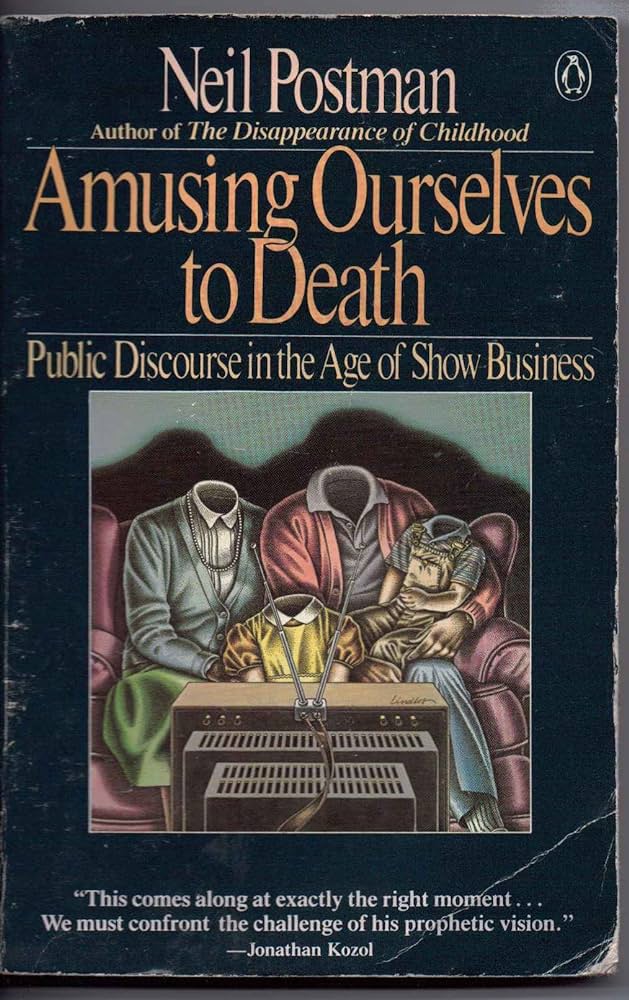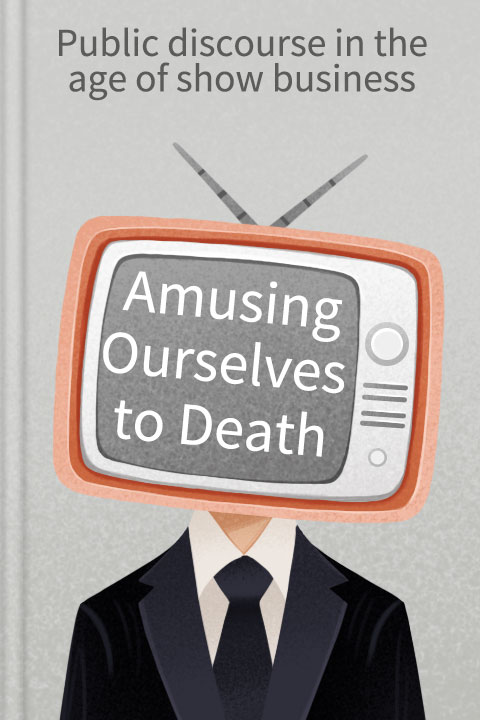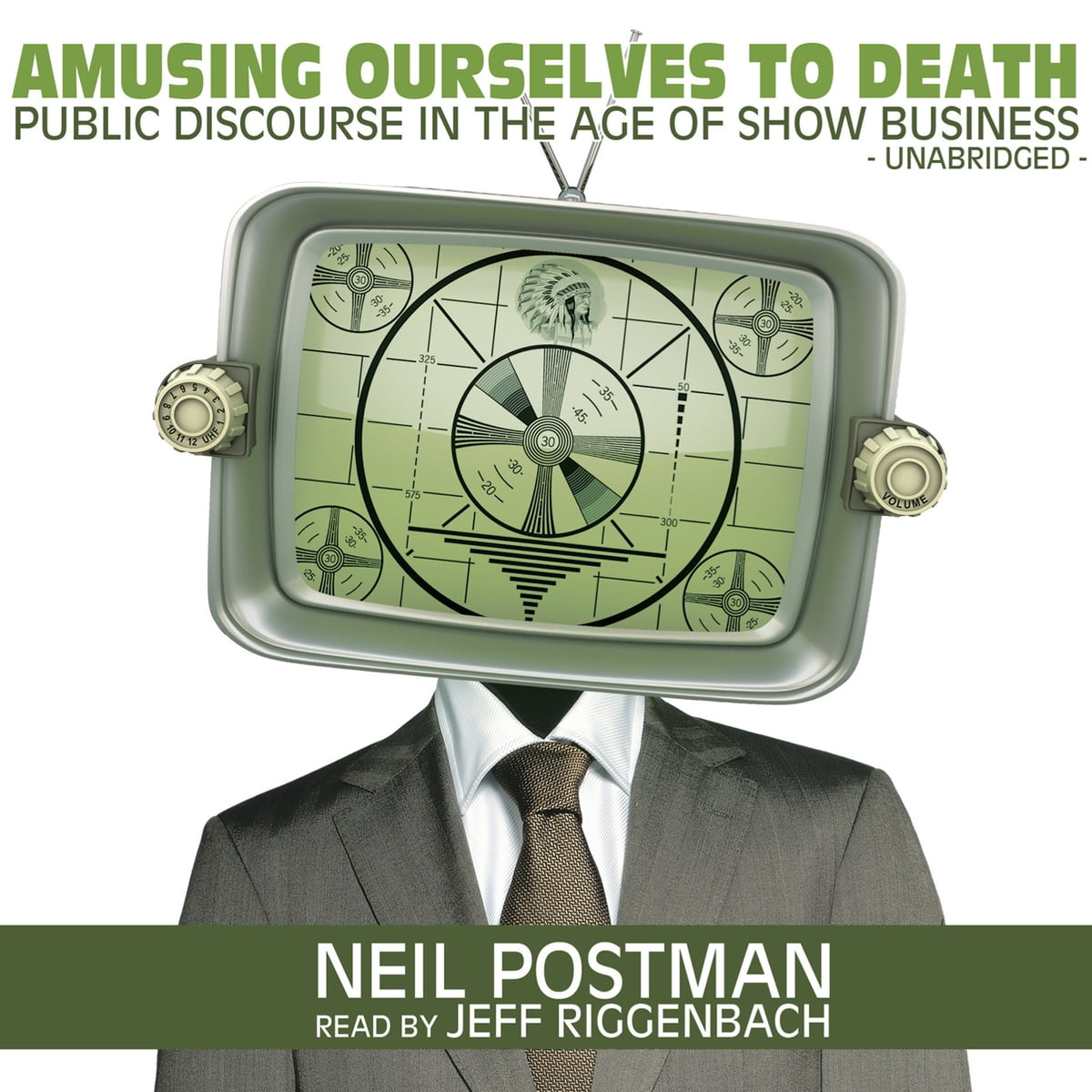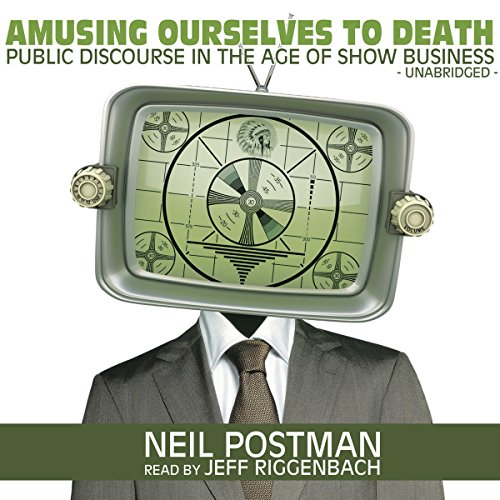Neil Postman’s “Amusing Ourselves to Death” Audiobook explores how television and entertainment impact public discourse. It argues that media shapes society’s understanding of reality.
Neil Postman’s “Amusing Ourselves to Death” delves into the profound effects of television and media on public discourse and cultural understanding. Postman contends that entertainment has become the dominant force in shaping how society perceives and engages with important issues.
This shift has led to a decline in the quality of public communication, reducing complex ideas to simplistic soundbites. The audiobook, narrated with engaging clarity, brings Postman’s critical insights to life, making it accessible to a broad audience. It challenges listeners to reflect on the consequences of an entertainment-saturated culture. For those interested in media studies and societal impacts, this audiobook is a compelling and thought-provoking listen.

Introduction To Neil Postman
Neil Postman was a famous media theorist and cultural critic. His ideas influenced the way we view media and technology today. One of his most popular works is Amusing Ourselves to Death, which discusses how television has impacted public discourse.
Early Life And Education
Neil Postman was born on March 8, 1931, in New York City. He grew up in a working-class family. Postman attended the State University of New York at Fredonia. He earned his bachelor’s degree there. Later, he received his master’s and doctoral degrees from Teachers College, Columbia University.
Influential Works And Theories
Postman wrote many books and essays during his career. Some of his most influential works include:
- Amusing Ourselves to Death
- The Disappearance of Childhood
- Technopoly
In Amusing Ourselves to Death, Postman argues that television has turned important public discourse into entertainment. He believes this change has negative effects on society. In The Disappearance of Childhood, Postman explores how media has blurred the lines between childhood and adulthood.
Postman’s theories often focus on the impact of technology on society. He warns against the uncritical acceptance of new technologies. He encourages people to think about how technology changes our lives and culture.
The Premise Of ‘amusing Ourselves To Death’
Neil Postman’s ‘Amusing Ourselves to Death’ delves into the effects of television on public discourse. The book examines how television, a visual medium, influences the way information is presented and consumed. Postman argues that the medium itself shapes the message. This idea is central to understanding the book’s premise.
The Medium As The Metaphor
In this section, Postman discusses the concept that the medium is a metaphor. He explains that each medium has its own grammar and structure. These characteristics determine how content is delivered. For instance, television prioritizes entertainment and visual appeal. This focus changes how news, education, and politics are presented.
| Medium | Characteristics | Impact |
|---|---|---|
| Television | Visual, Entertaining | Short Attention Spans |
| Textual, Analytical | In-depth Understanding | |
| Radio | Auditory, Imaginative | Engages Listening Skills |
The Age Of Show Business
Postman describes the modern era as the Age of Show Business. He argues that television has turned all public discourse into entertainment. Serious topics are often presented with the same flair as entertainment shows. This shift affects our perception of reality and importance. Politicians become celebrities, and news becomes infotainment.
- News Broadcasts: Short, sensational stories dominate.
- Education: Emphasis on engagement over depth.
- Politics: Focus on personality and image.
The audiobook version of ‘Amusing Ourselves to Death’ brings these ideas to life. Listening to Postman’s insights can be a thought-provoking experience. It offers a new perspective on the media we consume daily.
Key Concepts Explored
Neil Postman’s “Amusing Ourselves to Death” audiobook dives deep into the impact of television on public discourse. The book explores how television shapes the nature of information and our understanding of truth. Here are some key concepts discussed:
Truth In The Television Age
Postman argues that television has changed our perception of truth. In the past, books and newspapers were the main sources of information. These mediums required readers to think critically and understand complex ideas.
Television, on the other hand, prioritizes entertainment over information. News is presented in short, flashy segments. This makes it hard to understand complex issues. Postman believes this shift has made us less informed.
He also suggests that television blends fact and fiction. This makes it hard to tell what is true and what is not. Postman worries that we are losing our ability to distinguish between reality and entertainment.
The Public Discourse Transformation
The book also explores how television has transformed public discourse. Public discourse refers to the way we talk about important issues as a society. In the past, this was done through debates, speeches, and written articles. These formats allowed for deep, thoughtful discussions.
With the rise of television, public discourse has become more shallow. TV shows and news programs focus on sensational stories. This means important topics often get ignored. Postman argues that this shift has weakened our democracy. People are less informed and less able to participate in meaningful discussions.
Postman also notes that television favors simple, emotional messages. Complex arguments are hard to convey in a few minutes of airtime. As a result, public discourse has become more about emotions than facts.
Overall, “Amusing Ourselves to Death” highlights the dangers of a media landscape dominated by television. The audiobook provides a thought-provoking look at how media shapes our understanding of the world.
Comparing Past And Present Media Landscapes
Neil Postman’s book, Amusing Ourselves to Death, offers a deep dive into the evolution of media. This audiobook sheds light on how public discourse has shifted over time. Let’s explore how media landscapes from the past compare to today’s media world.
From Typographic America To Televised Culture
In the past, America was a typographic society. People read books, newspapers, and letters. Reading required deep thinking and focus. Public debates were rich in content and logic.
Today, we live in a televised culture. TV and screens dominate our lives. Images and sounds capture our attention. This shift has changed how we process information. Our focus is now on entertainment.
| Era | Primary Media | Key Characteristics |
|---|---|---|
| Typographic America | Books, Newspapers | Deep Thinking, Logical Debates |
| Televised Culture | TV, Screens | Visual, Entertaining |
The Shift In Public Discourse
The shift from a typographic society to a televised culture has altered public discourse. In the past, people engaged in serious debates. They used facts and logical arguments.
Today, public discourse is driven by visual appeal and entertainment value. Short soundbites and catchy images dominate discussions. This change affects how we understand and discuss important issues.
- Past: Focus on logic and facts.
- Present: Focus on visuals and entertainment.
This shift has significant implications. It influences our culture, politics, and daily lives. Neil Postman’s insights in Amusing Ourselves to Death help us understand these changes better.
The Impact On Society
Neil Postman’s book Amusing Ourselves to Death is a profound commentary. It explores how media consumption affects our society. The audiobook version makes it even more accessible. This section delves into its impact on education, politics, and more.
Education And Entertainment Blur
Postman argues that education and entertainment are merging. Schools use entertaining methods to teach. This can dilute the seriousness of learning. Students expect fun instead of hard work.
This shift affects the quality of education. It prioritizes amusement over deep understanding. Traditional teaching methods are being replaced. This change can have long-term effects on student knowledge.
Political Discourse In The New Age
Postman highlights a shift in political discourse. Politicians now use media to entertain. This can lead to a less informed public. People focus more on personalities than policies.
The media’s role in politics has changed. It shapes public opinion in new ways. This can undermine serious political debate. The focus is on spectacle rather than substance.
Critiques And Counterarguments
Neil Postman’s Amusing Ourselves to Death audiobook has sparked many debates. This section explores contemporary criticisms and Postman’s responses.
Contemporary Criticisms
Many critics argue Postman’s views are too extreme. They believe he overstates the dangers of television. Critics also say he ignores the benefits of media. Some feel he is too nostalgic for the past.
Others point out that technology has evolved since Postman’s time. They argue his ideas may not apply to modern media. New platforms like the internet and social media bring new dimensions. These critics think Postman’s work needs updating.
Postman’s Responses And Later Reflections
Neil Postman addressed many criticisms in his later works. He acknowledged that technology changes rapidly. But he stood by his core message. He believed media shapes our society deeply.
Postman also noted that new media could be more harmful. He argued that the internet spreads misinformation quickly. This, he felt, reinforced his original points. Postman did not see new media as a positive change.
| Criticism | Postman’s Response |
|---|---|
| Too nostalgic | Postman said nostalgia highlights what we lose. |
| Ignores media benefits | He focused on long-term societal impacts. |
| Outdated views | Postman believed core issues remain relevant. |
Postman remained firm in his beliefs. He felt media should educate, not just entertain. This perspective still sparks debate today.
Legacy Of ‘amusing Ourselves To Death’
Neil Postman’s book, ‘Amusing Ourselves to Death’, has left a lasting impact. Written in 1985, it discusses how television affects public discourse. The audiobook version continues to captivate listeners. Postman’s ideas remain significant in understanding media’s role in society.
Influence On Media Studies
Neil Postman’s work has deeply influenced media studies. His insights are still relevant for students and scholars. Many courses include his book as essential reading.
Postman argued that television turns important topics into entertainment. This idea has shaped many media studies theories.
Here are some key points of his influence:
- Television’s effect on politics
- Entertainment’s role in news
- Impact on education
| Area of Influence | Key Insight |
|---|---|
| Politics | Shifts focus from policy to personality |
| News | Prioritizes entertainment over information |
| Education | Encourages passive learning |
Relevance In The Digital Age
Postman’s ideas are even more relevant today. We now live in the digital age. Social media, streaming services, and online news dominate our lives.
‘Amusing Ourselves to Death’ predicted some of today’s challenges. The book warns about the dangers of prioritizing entertainment. This warning applies to digital platforms too.
Here is how it applies today:
- Social media algorithms favor entertaining content
- Online news often focuses on clicks rather than facts
- Streaming services create binge-watching cultures
The audiobook version of Postman’s work is a must-listen. It offers timeless insights on media’s impact on society.

Concluding Thoughts On Postman’s Warning
Neil Postman’s Amusing Ourselves to Death audiobook delivers a powerful message. His work challenges us to reflect on the media’s impact on our lives. As we listen, we understand his concerns about entertainment overshadowing serious discourse.
Assessing Today’s Media Landscape
Today’s media landscape is vastly different from Postman’s time. We have more channels, platforms, and content than ever before. Social media, streaming services, and 24-hour news cycles dominate our attention. The sheer volume of content can be overwhelming.
- Social Media: Platforms like Facebook, Twitter, and Instagram shape public opinion.
- Streaming Services: Netflix, Hulu, and Disney+ offer endless entertainment options.
- 24-Hour News Cycles: News networks constantly bombard us with information.
Postman warned of the dangers of a media-saturated society. We see his predictions in our daily lives. Serious news often takes a backseat to sensational stories. Important issues get overshadowed by viral content.
Heeding Postman’s Warning In The 21st Century
We must heed Postman’s warning to maintain a healthy media diet. Balancing entertainment with informative content is crucial.
- Limit social media usage to avoid information overload.
- Choose reliable news sources for accurate information.
- Engage in meaningful discussions about current events.
Parents play a vital role in guiding their children’s media consumption. Encourage kids to read books and engage in educational activities. Teach them to question the information they see online.
Schools can also help by incorporating media literacy into the curriculum. Students should learn how to critically analyze media content. Understanding the difference between entertainment and news is essential.
As individuals, we have the power to make informed choices. By prioritizing quality content, we can avoid the pitfalls Postman warned about. Let’s strive for a balanced media diet and a more informed society.

Frequently Asked Questions
What Is “amusing Ourselves To Death” About?
“Amusing Ourselves to Death” explores how television and media shape public discourse. Neil Postman argues that entertainment values degrade serious communication and critical thinking.
Who Is Neil Postman?
Neil Postman was a renowned cultural critic and media theorist. He authored several influential books on media and education, including “Amusing Ourselves to Death. “
Is “amusing Ourselves To Death” Relevant Today?
Yes, “Amusing Ourselves to Death” remains relevant. It addresses the impact of media on society, which is increasingly pertinent in the digital age.
Where Can I Find The Audiobook?
The audiobook of “Amusing Ourselves to Death” is available on platforms like Audible and Google Play. Check your favorite audiobook service.
Conclusion
Neil Postman’s “Amusing Ourselves to Death” audiobook offers timeless insights. It challenges our media consumption habits. This audiobook is a must-listen for anyone interested in media literacy. Its thought-provoking content is both educational and engaging. Dive in to understand the impact of entertainment on society.
Don’t miss this essential listen!



